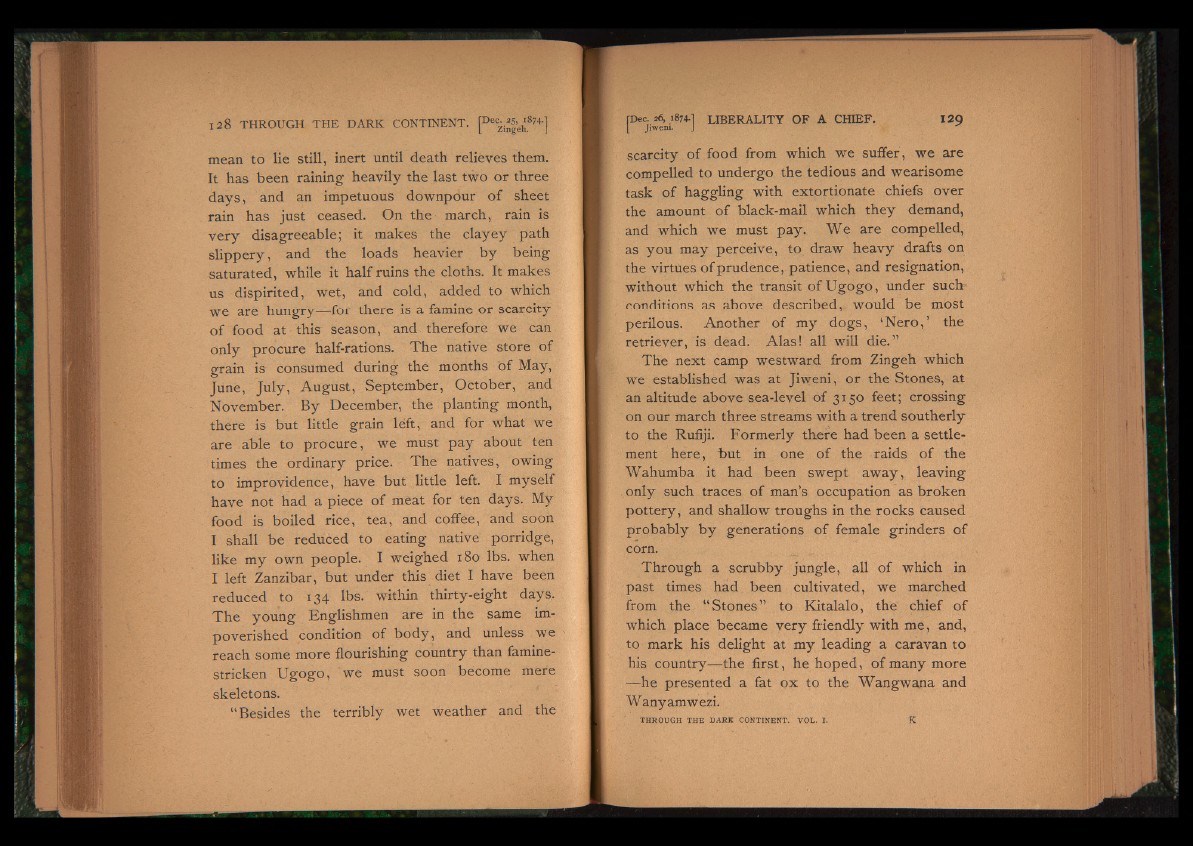
mean to lie still, inert until death relieves them.
It has been raining heavily the last two or three
d a y s , and an impetuous downpour o f sheet
rain has just ceased. On the march, rain is
v e ry disagreeable; it makes the cla y ey path
s lippery, and the loads heavier b y being
saturated, while it half ruins the cloths. It makes
us dispirited, wet, and cold, added to which
we are hungry— for there is a famine or scarcity
o f food at this season, and therefore we can
only procure half-rations. The native store o f
grain is consumed during the months b f May,
June, July, August, September, October, and
November. B y December, the planting month,
there is but little grain left, and for what we
are able to procure, we must p a y about ten
times the ordinary price. The natives, owing
to improvidence, have but little left. I myself
have not had a piece o f meat for ten days. My
food is boiled rice, tea, and coffee, and soon
I shall be reduced to eating native porridge,
like my own people. I weighed 180 lbs. when
I left Zanzibar, but under this diet I have been
reduced to 134 lbs. within thirty-eight days.
T h e young Englishmen are in the same impoverished
condition o f b od y , and unless we
reach some more flourishing country than famine-
stricken U g o g o , we must soon become mere
skeletons.
“ Besides the terribly wet weather and , the
[Dec. 26, 1874.1 LIBERALITY OF A CHIEF.
Jiwem. J
scarcity o f food from which we suffer , we are
compelled to undergo the tedious and wearisome
task o f haggling with extortionate chiefs over
the amount o f black-mail which they demand,
and which we must pay. W e are compelled,
as yo u may perceive, to draw heavy drafts on
the virtues o f prudence, patience, and resignation,
without which the transit o f U g o g o , under such"
conditions as above described, would be most
perilous. Another o f my dogs, ‘N e ro ,’ the
retriever, is dead. Alas! all will die.”
The next camp westward from Zingeh which
we established was at Jiweni, or the Stones, at
an altitude above sea-level o f 3150 feet; crossing
on our march three streams with a trend southerly
to the Rufiji. Formerly there had been a settlement
here, but in one o f the raids o f the
Wahumba it had been swept aw ay , leaving
only such traces o f man’s occupation as broken
pottery, and shallow troughs in the rocks caused
probably b y generations o f female grinders o f
corn.
Through a scrubby jungle, all o f which in
past times had been cultivated, we marched
from the “ Stones” to Kitalalo, the chief o f
which place became v e ry friendly with me, and,
to mark his delight at my leading a caravan to
his country— the first, he hoped, o f many more
— he presented a fat o x to the Wangwana and
Wanyamwezi.
THROUGH THE DARK CONTINENT. VOL. I. K